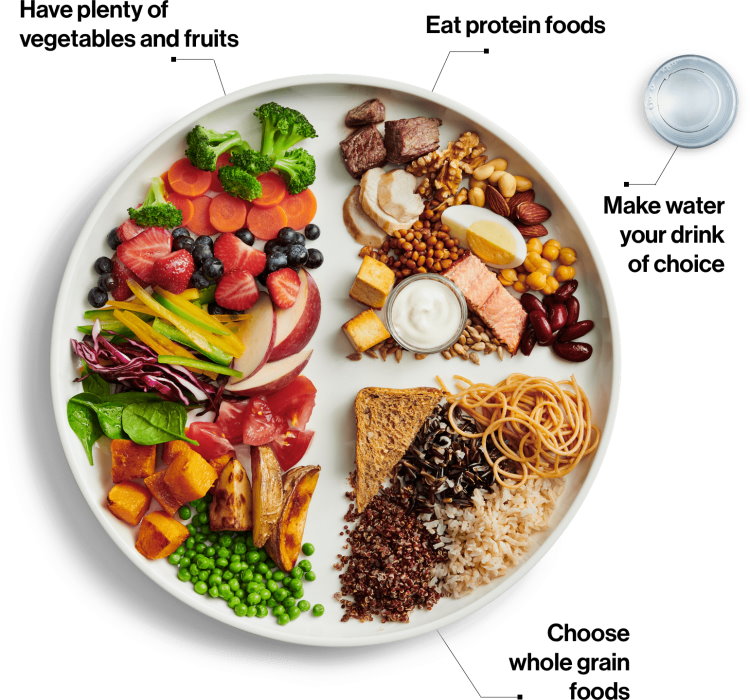The Global Problems
Until recently, the exponential growth of the population brought new challenges to our daily life. The influence of some of these world’s biggest issues has also begun to manifest itself in the recommended dietary guidelines.
- Climate change – increasing greenhouse gas emissions
- Ocean conversation – overfishing and unsustainable fishing practices
- Factory farming
- Food and water security – sustainability
Canadian Dietary Recommendation
In 2019, the Canadian government presented a new “innovative” dietary recommendation based on current scientific knowledge and current world trends. As you can see in the picture, half of the food on your plate should be fruits and vegetables.

Healthy eating is more than the foods you eat:
- Be mindful of your eating habits
- Cook more often
- Enjoy your food
- Eat meals with others
- Use food labels
- Limit highly processed foods
- Marketing can influence your food choices
Veganism, A New Trend in Diet
Canada is the first country to promote the vegan diet. We still find meat and dairy products in their suggestions, but it is recommended to limit these food sources; based on many studies that have verified that:
- red and processed meat increases the chance of cancer and shortens your life
- an alternative meat substitute leads to a reduction in LDL cholesterol and thus a reduction in heart disease
- replacement of saturated fats with unsaturated fats leads to an improvement in blood lipid levels
Four Main Reasons to Become a Vegan
1. Earth’s Pollution
Before your food reaches its plate, it goes through a long process. Each part produces a certain amount of greenhouse gases. However, the greatest impact on our planet is the use of land for farming, the emissions produced by livestock. The pesticides we use for farming and the food and water we give animals are also important factors.

Overall, animal-based foods have a much higher carbon footprint than plant-based. The worst is beef (60 kg of greenhouse gases per 1 kg of meat), lamb (24 kg of CO2 per 1 kg of meat), and cheese (21 kg of CO2). Poultry (6 kg CO2) and fish (5 kg CO2) are better off, but it still does not match the plants, which produce only 0.3 to 4 kg CO2 per kg.
2. Sustainable Food, Efficiency in Food System
Meat (food for the rich) is a very inefficient source of nutrients, especially now that one of the world’s problems is food shortages. While livestock occupies 77% of the world’s agricultural land, they produce only 18% of the world’s calories (16 times less) and 37% of total protein (6 times less) compared to plant-based food.
3. Health Benefits
There are several long-term studies conducted on a sufficiently large sample of the population, where we find a correlation between meat intake and the negative impact on our health. There is a direct relationship between eating meat and your lifespan — eating meat shortens your life.
Consuming meat further increases the likelihood that you will get cancer, diabetes, or heart attack. Consumption of red (beef, lamb, pork) and processed meat (sausages, salami) shows the worst results, but you can also find shortcomings in poultry.
For dairy products, you find a lot of pros and cons, which are mostly contradictory, and a lot of research ends with the sentence: “More research is needed in this area.” The same goes for fish, where the main health risk is the pollution of today’s oceans – fish are exposed to toxic substances, especially heavy metals. Dairy products and fish may appear to be necessary sources of omega-3 fatty acids, vitamin D, and others. However, today it is no problem to obtain these vitamins and minerals from other better sources — nuts, seeds, and food supplements.
4. Spiritual Well-Being
Is there a path of nonviolence and compassion for all other living beings that would allow you to eat the flesh of living creatures? The only thing that comes to my mind is that when you see today’s food waste in the West, you can’t help but feel a little sad. Sadder still is to see these living beings subject to this food waste. Killing any living being is wrong, but wasting its sacrifice is even worse.
“Since all sentient beings are equal to me as my only son,
Buddha
how can I approve my followers to eat the flesh of my son?
Eating meat to me is out of the question. I have never approved,
I am not, and I will never approve that – I have
strictly condemned eating meat in every way.”
Only a fool might think that buying meat does not contribute to a cycle of unethical killing. If you consciously eat meat or dairy products, it isn’t hard to see what’s behind it all. How the consumption of these foods affects you internally — by accepting the memory of another being and thus affecting your physical memory and karma.
Veganism — A Way for Everyone Who Cares About the Planet and Their Health
I do not want to provoke a war between those who eat meat and those who do not. I, until recently, was one of the meat lovers. I could not imagine life without meat, and yet today I am a fruit lover. I just wanted to point out that you could rethink your daily decisions. Do you really need to eat meat, dairy products, and fish? Consider the impact this daily decision of yours has on our mother earth and your health.
Being vegan doesn’t mean we are anything more than others. We should all be equal. Both women, men, and other beings among us have their place here. Let’s respect all animals and other beings as you respect your neighbors. Let’s create a harmonious place on earth where everyone will be happy. Let’s become part of the perfect order on the planet and not fight against it. Let’s leave the meat to carnivores, milk to calves, and focus on the fruits and vegetables your body needs… embrace the frugivore inside you.